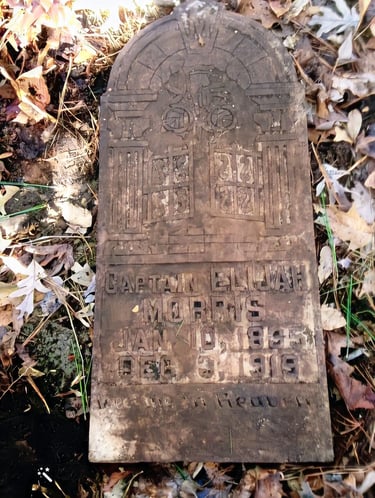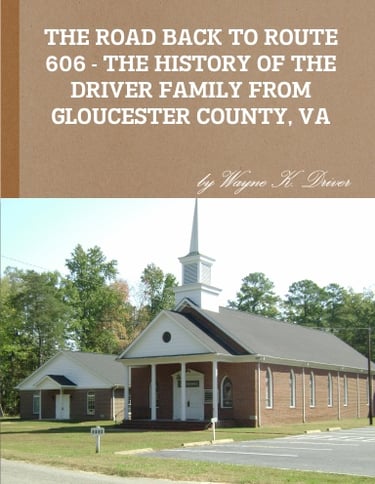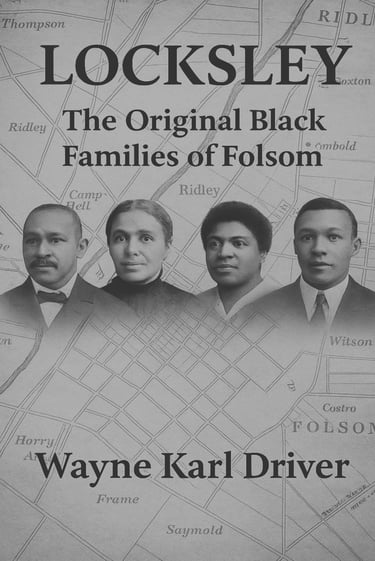The Captain Elijah Morris
Who was Captain Elijah Morris? Was his title official, occupational, or a term of respect? Let’s explore the life and legacy of this free African American landowner from Gloucester County, Virginia, and discover what his story reveals about early Black history in Tidewater.
MORRIS FAMILYOYSTERMANLAND OWNERGLOUCESTER COUNTY, VA
Wayne Karl Driver
9/16/20252 min read


The Story of Captain Elijah Morris
The Morris family legacy in Virginia reaches back to the late 1600s. Historical research—including parish records, county tax rolls, and family oral history—confirms that the Morrises were among the region’s Free People of Color (FPOC), often of mixed ancestry, who established roots in Gloucester County.
One of the earliest possible family connections appears in Christ Church Parish, Middlesex County, which recorded the baptism of “Winifred Morris, a Molatto belonging to Francis Weekes Jun’r, baptized 25 January 1707” (Christ Church Parish Register). While I cannot yet confirm a direct link between Winifred and Elijah, this record underscores how far back the Morris name stretches in Tidewater, Virginia.
Fast forward to the 1800s, and we meet Elijah Morris—my paternal 2nd great-grandfather. He was the father of Margaret Ann Morris, who later married my great-grandfather, John William Driver. According to Gloucester County records, Elijah was both an oysterman and farmer, and he owned about 100 acres of land—a remarkable achievement for a free Black man in antebellum Virginia. That land still remains in the hands of Elijah Morris’ descendants today.
The Discovery of His Grave
The spark for this blog came from a call I received years ago. A group of hunters once stumbled across what looked like an old, overgrown graveyard. Among the sunken plots, one marker stood out: it belonged to Captain Elijah Morris.
Most older graves from the period were marked with wood, which eventually rotted away. Elijah’s grave, however, bore a durable stone marker, suggesting he had the means to afford something more permanent. What stood out most was the word “Captain.”
At first, I wondered: Did Elijah serve in the Civil War and rise to the rank of captain? After much searching, I found no evidence of military service. A more likely explanation is tied to his work. In Tidewater Virginia, “Captain” was often the title given to men who commanded their own boats in the thriving oyster and fishing industry. Another possibility is that it was a community honorific, bestowed out of respect for his leadership.
Either way, the title reflects Elijah’s standing. His life and legacy were worth remembering.
Why This Matters
Stories like Elijah’s remind us that:
Free People of Color were present and visible in colonial and antebellum Virginia. They appear in tax lists, land deeds, and parish registers (see Heinegg, 2005).
Interracial unions were not limited to enslavers and the enslaved. Relationships also formed among white indentured servants, free Black people, and mixed-race families.
Church records are treasure troves. In colonial Virginia, the Church of England (Anglican Church) was the established church and doubled as a civil authority—recording births, baptisms, marriages, and sometimes even social status.
Titles tell stories. Whether earned through occupation or given as marks of respect, titles like “Captain” reflect how peers and their community viewed someone.
Graveyards preserve history. Even unmarked or overgrown plots can reveal stories of family, community, and resilience.
Additional Resources
Vikki Bynum, Free People of Color in Old Virginia: The Morris Family of Gloucester County, A Case Study (Renegade South, 2011).
Paul Heinegg, Free African Americans in Virginia, North Carolina, South Carolina, Maryland, and Delaware (2005).
Parish Register of Christ Church, Middlesex County, Virginia.
Connect With Us
To stay informed about the latest research and discoveries, connect with us on our social media channels.
© 2025. All rights reserved.
Let's Keep In Touch




